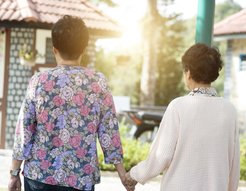Aging, Mobility and Emotional Labor in East and Southeast Asia
Mika Toyota

Increasing numbers of people in the world are going to live through their last stage of life alone without family members due to the decreasing marriage rate. In Japan, for example, 23 percent of people aged between 60 and 64 are not married (2019). Who is going to care for them? Transnational care arrangements have emerged as a solution. Through ethnographic studies of the following three phenomena, I aim to analyze transnational assemblages of care and social innovations in elderly care:
- The emerging retirement industry and care cooperatives among international migrant retirees in Southeast Asia (Thailand, Malaysia, and the Philippines).
- The export of “Japanese-style nursing” by Japanese care enterprises to Southeast Asia, which includes training local workers to deliver care work and manage emotions in a certain way.
- Rural revitalization initiated by older villagers, particularly through the development of tourism that is typically oriented towards education and the environment.
Care for older persons involves intense emotional labor, which is also central in older persons’ own volunteer work, organizational efforts, and hospitality initiatives. Seniors’ emotional labor also functions as an emotional resource, as it energizes them and offers them an opportunity to act collectively. My research pays close attention to the active, positive emotional labor performed by senior citizens. By doing so, the research will expand upon theories of emotional labor (e.g. Hochschild).
My preliminary research suggests that there are significant gender differences in these practices. For instance, Japanese men are more likely to feel isolated than women after retirement and koritsu-shi (deaths in isolation) is clearly male dominated. More than 80 percent of all reported koritsu-shi were male in 2018, despite the fact that women make up 67 percent of older people who live alone. This can be understood as an effect of the social distribution of emotions. Men’s emotions tend to be strongly shaped by their working life, a bond that has been an integral part of Japan’s post-war development model. This resulted in particular emotional dispositions. Emotional labor for and by older persons thus provides a lens to rethink multiple aspects of broad historical developments.
